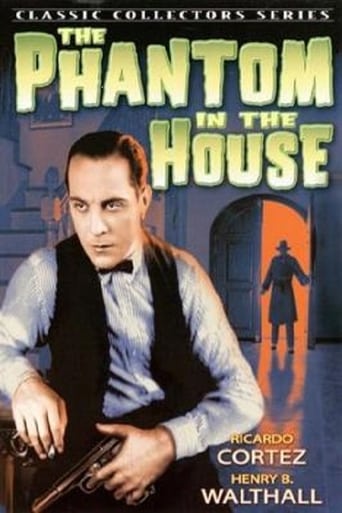

Lack of good storyline.
... View MoreI cannot think of one single thing that I would change about this film. The acting is incomparable, the directing deft, and the writing poignantly brilliant.
... View MoreGreat example of an old-fashioned, pure-at-heart escapist event movie that doesn't pretend to be anything that it's not and has boat loads of fun being its own ludicrous self.
... View MoreThe story, direction, characters, and writing/dialogue is akin to taking a tranquilizer shot to the neck, but everything else was so well done.
... View MoreThe Phantom in the House (1929) ** (out of 4)Peggy (Grace Valentine) accidentally kills her lover just as her husband Boyd (Henry B. Walthall) walks in. Boyd agrees to say he did the crime and spends the next fifteen-years in prison. When he's released he meets back up with the wife but both agreed not to tell their now adult daughter Dorothy (Nancy Welford) that he's really daddy. Soon she wanting to marry Paul (Ricardo Cortez) but he's accused of a murder he didn't really commit. This leads Boyd with a decision to make.If you watch enough of these early sound pictures then you'll notice a few things. For starters, there's usually some sort of musical number for no reason. Second, there's usually a lot of boring dialogue that means absolutely nothing to the story. The third thing you'll notice is that there's usually enough plot for ten different movies. All of this can be understood because sound was something new and people wanted to hear it.With that said, those three things usually make these early talkies rather difficult to watch today and there's no question that this here is one of the silliest I've ever seen. The entire plot is just downright crazy and stupid. What makes matters even worse is that the love affair, the murder, the lie and the prison term is all handled in the first seven minutes of the movie. From here we get on to the new stuff with the daughter getting involved with a man her mother doesn't approve of. This here leads to another murder and we're off on a whole new storyline.The best thing about this picture is Walthall who really was a very good actor. He was perfectly capable of handling silent pictures and he made the transition to sound very well. He's very low-key here but he's certainly easy to follow and you can't help but enjoy the performance and the character Cortez gets the top-billing but the picture certainly belongs to Walthall as he's the actual lead. The supporting performances are mixed to say the least with Valentine coming off the worst with her overacting.THE PHANTOM IN THE HOUSE is a pretty routine drama and for the most part it's very boring. The over-the-top nature of the story and the fact that it was an early sound picture help keep it mildly interesting but for the most part it's a dud.
... View MoreNot a bad effort for its era. People seeing the audience reaction in "Singin' In the Rain" are seeing an anachronism.That would be the reaction of a 1950 audience used to perfected talking pictures.But for audiences accustomed to silent movies,even imperfect sound was marvelous,making complicated plots like this far more practical than with silents. As others said, Henry Walthall and Ricardo Cortez give very professional performances. The film of course is "stagy", partly due to the limitations of sound equipment at the time but more due to the type of story it was.Even later efforts like"The Mask of Demetrius" were just about as stagy because of the nature of the plot. For one thing, this and other movies allow us to see basically what a stage melodrama of the period was like,something almost impossible to completely duplicate today,because todays actors simply didn't grow up in that old tradition. Still, the sets are very interesting, and it is somewhat filmic, allowing scenes and shots such as closeups that stage can't provide, so it is better than merely a filmed stage play. All in all a rather interesting movie.
... View MoreNancy Welford could sing a song, but she couldn't act to save her life. Grace Valentine, to judge from this effort, couldn't act period. Not that this is exactly what you would call a class "A" production. It's a "B" through and through, so poor acting doesn't matter all that much – nor does a believable script – so long as the movie delivers plenty of thrills. This it does not do. There's a bit of a climax certainly, but nothing temperature raising. Phil Rosen has directed with all the expertise of his counterpart at the Podunck Amateur Dramatic Society. True, Ricardo Cortez, Henry B. Walthall and Jack Curtis manage to extricate themselves from this dreary "B" with one or two kudos, but everyone else sinks with it.
... View MoreThis 1929 mystery-tearjerker suffers from all the stereotypical problems of talkies in this year -- a very few works like Mamoulian's APPLAUSE aside -- immobile camera and actors who seem unable to read a line with any naturalism. The sound track sounds poor, too, but that might will be an artifact of a worn print.Director Phil Rosen makes a good stab by using short cuts to fake a mobile camera, and it's a pleasure to watch old pros Henry Walthall and Ricardo Cortez exhibit their physical naturalness, but the many poor performances and, by modern standards, decidedly pinheaded plot keep this from being worthwhile as more than a curiosity.
... View More